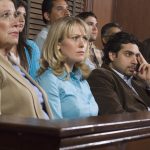“Face of Greed” Stands Trial in the US

The fraud conviction of price-gauging pharmaceutical entrepreneur Martin Shkreli (pictured) has raised concerns that he may not have received a fair trial from an impartial jury, after hundreds of potential jurors were dismissed for perceived bias during the selection process.
Unlike in Australia, parties in the United States are permitted to ask potential jurors a range of relevant questions, including their attitude towards the defendant and the crime they are alleged to have committed. The parties can then make an informed decision about whether to ‘strike off’ a potential juror (which called a ‘peremptory challenge’ in Australia), or allow them to be empanelled.
The dismissal of so many potential jurors during the selection process in the Shkreli case also raises broader questions about whether high profile figures – especially those who are subjected to adverse media reporting or otherwise despised by the public – and those charged with particularly abhorrent crimes, can ever receive a fair trial at the hands of twelve members of the general community.
The “face of greed”
Mr Shkreli’s became a target of disdain at the end of 2015 during his term as the chief executive of Turing Pharmaceuticals.
Turing acquired the potentially lifesaving drug, Daraprim, in August 2015 and drastically increased the price by 5000%, from $13.50 to $750 per pill.
At a Senate hearing, a doctor who treats babies with life-threatening toxoplasmosis testified that a course of treatment with Daraprim went from about $1,200, to no less than $69,000.
Daraprim is the only approved treatment for toxoplasmosis, an infection that is most prevalent in pregnant women, cancer patients and sufferers of HIV/AIDS.
Mr Shkreli defended the company’s price hike, saying it was necessary to generate a profit after the exorbitant price paid to purchase the drug.
A number of personal choices contributed to the public’s dislike of Shkreli – including his decision to purchase the only copy of a 2014 album by rap group ‘Wu-Tang Clan’ for $2 million, and then refuse to allow the public to hear it.
Fraud charges
Mr Shkreli was arrested on securities fraud and wire fraud charges in December 2015, which arose from an alleged Ponzi scheme he ran at his previous companies, MSMB Capital Management and Retrophin.
Prosecutors alleged that Shkreli use Retrophin’s cash and stock to pay back hedge fund investors for money that Shkreli had lost at MSMB. The actions were said to have taken place between 2009 and 2014.
US Attorney Robert Capers told the media that Shkreli had, “engaged in multiple schemes to ensnare investors through a web of lies and deceit”.
After a gruelling selection process whereby most of the potential jurors were struck off for bias, a jury was eventually empanelled and ultimately found Mr Shrekli guilty of the three fraud-related charges.
Jury bias
Most of the potential jurors admitted knowing about Shkreli’s conduct relating to Daraprim, and admitted they could not remain impartial.
The concern is that others may have lied about not knowing of his previous conduct, in order to be selected and “make him pay”, and that Shkreli did not receive a fair trial, nor could he ever receive a fair trial in the US.
The extent of juror bias is illustrated by the following extracts of the court transcript:
Juror 1: “Im aware of the defendant and I hate him… I think he’s a greedy little man.”
Juror 18: “Both of my parents are on prescriptions that have gone up over the past few months, so much that they can’t afford their drugs. I have several friends who have H.I.V. or AIDS who, again, can’t afford the prescription drugs that they were able to afford.”
Juror 40: “I saw the testimony on TV to Congress and I saw his face on the news last night. By the time I came in and sat down and he turned around, I felt immediately I was biased.”
Juror 48: “He’s the most hated man in America. In my opinion, he equates with Bernie Madoff with the drugs for pregnant women going from $15 to $750. My parents are in their eighties. They’re struggling to pay for their medication.”
Juror 67: “Who does that, puts profit and self-interest ahead of anything else? So it’s not a far stretch that he could do what he’s accused of.”
Juror 77: “From everything I’ve seen on the news, everything I’ve read, I believe the defendant is the face of corporate greed in America… You’d have to convince me he was innocent rather than guilty.”
Juror 144: “I don’t think I can… [be impartial] because he kinds of looks like a dick”.
Australian law
As stated, the prosecution and defence in Australian criminal trials are not permitted to ask jurors questions during the selection process; which makes it impossible to make an informed decision about whether to “challenge” a juror (ie to remove them from the jury panel).
In Australia, the parties are allowed to make three peremptory challenges for each defendant. So, for example, where there are two accused persons in a trial, each defendant will be able to make three challenges, and the prosecutor will be able to make six.
In an attempt to overcome the problem of impartial juries, and to deal with trials involving complex expert evidence which may confuse or lead to unfairly prejudiced juries, section 32 of the Criminal Procedure Act 1986 (NSW) creates a mechanism to apply for a trial by ‘judge alone’.
The section provides that an accused or prosecutor may apply for a ‘judge alone’ trial, and such a trial must be ordered if both parties agree.
A judge alone trial cannot be ordered if the accused does not agree, but the court may make such an order if it is applied for by the accused and is ‘in the interests of justice’, even if the prosecutor disagrees.
In determining the ‘interests of justice’, the court is less likely to order a judge alone trial if the factual issue “requires the application of objective community standards, including (but not limited to) an issue of reasonableness, negligence, indecency, obscenity or dangerousness.”
Section 32A of the Act requires applications for judge alone trial to be made at least 28 days before the trial date, and applications in a trial involving more than one accused must be made by all of the accused persons.







